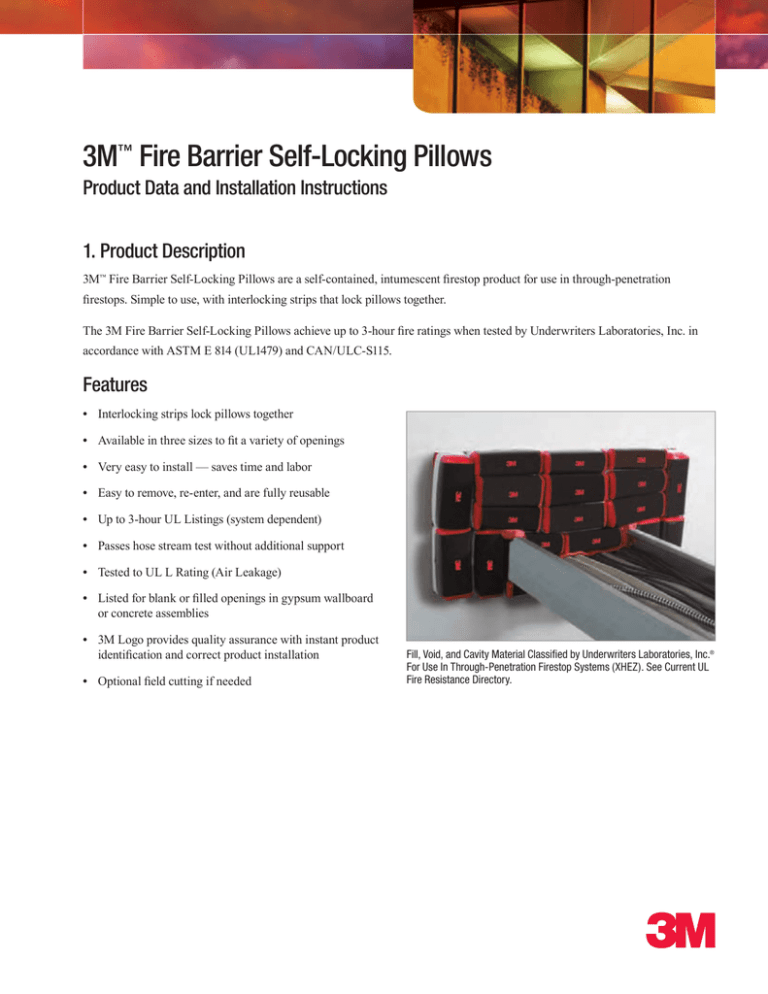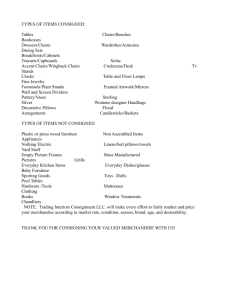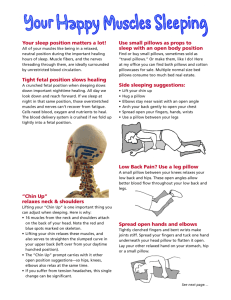
3M™ Fire Barrier Self-Locking Pillows
Product Data and Installation Instructions
1. Product Description
3M™ Fire Barrier Self-Locking Pillows are a self-contained, intumescent firestop product for use in through-penetration
firestops. Simple to use, with interlocking strips that lock pillows together.
The 3M Fire Barrier Self-Locking Pillows achieve up to 3-hour fire ratings when tested by Underwriters Laboratories, Inc. in
accordance with ASTM E 814 (UL1479) and CAN/ULC-S115.
Features
• Interlocking strips lock pillows together
• Available in three sizes to fit a variety of openings
• Very easy to install — saves time and labor
• Easy to remove, re-enter, and are fully reusable
• Up to 3-hour UL Listings (system dependent)
• Passes hose stream test without additional support
• Tested to UL L Rating (Air Leakage)
• Listed for blank or filled openings in gypsum wallboard
or concrete assemblies
• 3M Logo provides quality assurance with instant product
identification and correct product installation
• Optional field cutting if needed
Fill, Void, and Cavity Material Classified by Underwriters Laboratories, Inc.®
For Use In Through-Penetration Firestop Systems (XHEZ). See Current UL
Fire Resistance Directory.
2. Applications
• 3M™ Fire Barrier Self-Locking Pillows are ideal for firestopping medium to large openings with power or communication
cables, conduits and cable racks or trays.
• No additional support required. Consult UL or ULC Fire Resistance Directory for specific systems.
• Gypsum Wall, Concrete or Block Wall, and Concrete Floors
• Blank openings up to 540 sq. in. (3483 sq. cm)
• 1 or 2 Cable Racks or Trays per penetration
• Conduit bank, innerduct cable and cable racks or tray applications
For complete details see the UL through-penetration firestop systems available at the UL Online Certifications Directory
(www.ul.com) or the 3M Application and Specifiers’ Guide (www.mmm.com/firestop).
3. Typical Physical Properties
Density: 6 PCF (nominal)
4. Performance
3M Fire Barrier Self-Locking Pillows have been tested in accordance with ASTM E 84.
• Heat Expansion Begins: 392°F (200°C)
• Significant Expansion Begins: 536°F (280°C)
• Volume Expansion: 18% (calculated)
• L Rating: See individual UL Listings
Installation shall be in strict accordance with manufacturer’s written instructions. The product shall be classified by
Underwriters’ Laboratories, Inc. as a Fill, Void and Cavity Material. When installed in accordance with systems outlined in the
current UL or ULC Fire Resistance Directory and tested in accordance with ASTM E 814 (UL 1479) and CAN/ULC-S115, up
to a 3-hour rating is achieved.
5. Installation Techniques
1. Consult the individual UL system for required location of 3M Fire Barrier Moldable Putty MP+ within the opening.
2. Install 3M Fire Barrier Self-Locking Pillows so the 9" (22.8 cm) dimension travels through the wall or floor.
3. The large surface (side with label) of the 3M Fire Barrier Self-Locking Pillow must face the framing of the penetration. The
3M logo should face the installer.
4. Compress the pillows minimum 33% and insert units in the opening. A single size of pillow or combination of small,
medium and large self-locking pillows may be used to complete the correct firestop through-penetration installation.
5. Repeat the procedure until the penetration is completely full and the correct compression has been achieved.
6. Check for any openings between pillows, framing and penetrating items. Fill any visible openings with the required depth of
3M Moldable Putty+. Consult individual UL systems for Moldable Putty+ depth requirements.
7. To remove the 3M Fire Protection Self-Locking Pillows from the opening, first remove the putty. Gently loosen the selflocking bond between the desired pillows. Gently pull pillow(s) out and place on a clean surface. After additional penetrants
are routed through the opening, replace the pillow(s) making sure the self-locking portion of the pillow(s) are aligned.
8. Repeat 3M Moldable Putty+ installation in voids.
6. Product Offerings
Product
Unit Size
Units/Ctn.
Wt.Ctn.
3M Fire Barrier Self-Locking Pillow, Small
2 in. x 4 in. x 9 in. (51 mm x 10.2 cm x 22.8 cm)
8 sq. in. (51.6 cm2)
24
12.5 lbs. (5.6 kg)
3M Fire Barrier Self-Locking Pillow, Medium
2 in. x 6 in. x 9 in. (51 mm x 15.2 cm x 22.8 cm)
12 sq. in. (77.4 cm2)
16
11.0 lbs. (4.9 kg)
3M Fire Barrier Self-Locking Pillow, Large
3 in. x 6 in. x 9 in. (76 mm x 15.2 cm x 22.8 cm)
18 sq. in. (116.1 cm2)
20
17.5 lbs. (7.8 kg)
7. Calculating Self-Locking Pillow Requirement
Measure the opening in inches, and multiply the length by the width to get the total area. Then deduct the area of the penetrating
item (rack & cables) to determine the total open area (annular space). This is the amount of area to be firestopped.
Multiply the open area by a factor of 1.5 to determine the required area of uncompressed pillows. This will ensure that once
installed the pillow will achieve minimum 33% compression.
Estimate Table
(Cross-sectional area of Self-Locking Pillows)
Fire Barrier Self-Locking Pillow
Dimensions,
in (cm)
Nominal Area, in2 (cm2)
Area when compressed
33%, in2 (cm2)
Small
2" x 4" (5.1 x 10.2)
8 (51.6)
5.3 (34.2)
Medium
2" x 6" (5.1 x 15.2)
12 (77.4)
8 (51.6)
Large
3" x 6" (7.6 x 15.2)
18 (116)
12 (77.4)
Calculating Self-Locking Pillow Requirement (examples)
Example 1: Gypsum wall opening measuring 12" x 24" (30.5 cm x 61 cm) with a cable rack & cables occupying 40% of
the opening.
12" x 24" Opening = 288 sq. in. (1858 sq. cm)
Rack & Cable fill (40% of total opening area) = 115.2 sq. in. (743 sq. cm)
Total open area to be firestopped = 288 – 115.2 = 172.8 sq. in. (1115 sq. cm)
Multiply open area by a factor of 1.5 to find the required area of uncompressed pillows:
172.8 sq. in. x 1.5 = 260 sq. in. (1673 sq. cm)
Therefore, 260 sq. in. (1673 sq. cm) of uncompressed pillows are required to achieve 33% compression in this opening.
If all small pillows: 260 sq. in. / 8 sq. in. per pillow = 33 pillows (rounded up from 32.5)
If all medium pillows: 260 sq. in. / 12 sq. in. per pillow = 22 pillows (rounded up from 21.6)
If all large pillows: 260 sq. in. / 18 sq. in. per pillow = 15 pillows (rounded up from 14.4)
Example 2: Minimum Quantity of Pillows Required to Firestop a Blank Opening Using One Size of Self-Locking Pillow
to Achieve Minimum 33% Compression.
Opening Sizes, in.
Pillow Dimensions, in.
14 x 14
12 x 24
18 x 33
24 x 36
Small
Pillow Size
2x4
37
54
112
162
Medium
2x6
25
36
75
108
Large
3x6
17
24
50
72
30.5 x 61.0
45.7 x 83.8
61.0 x 91.4
Opening Sizes, cm
Pillow Size
Pillow Dimensions, cm
35.6 x 35.6
Small
5.1 x 10.2
37
54
112
162
Medium
5.1 x 15.2
25
36
75
108
Large
7.6 x 15.2
17
24
50
72
Any combination of small, medium, or large pillows can be used to firestop an opening provided the minimum compression
requirements are met.
8. Storage
The 3M™ Fire Barrier Self-Locking Pillows must be stored in a dry warehouse environment. Pallets should not be stacked.
9. Maintenance
Inspection: Installations should be inspected periodically for subsequent damage. Replace any damaged pillows.
Retrofit: Cables may be added or replaced by simply removing and replacing pillows and putty as required.
Remove by inserting fingers to both sides of the pillow at the 3M logo and squeeze to release the self-locking bond and gently
pull pillow out. 3M Fire Barrier Self-Locking Pillows are reusable.
10. Purchase Information
3M Fire Barrier products are available through a network of nationwide distributors. For information on where to buy go to
www.3m.com/firestop.
11. Safe Handling Information
Consult Material Safety Data Sheet prior to handling and disposing of 3M Fire Barrier Self-Locking Pillow(s).
12. Installation Instructions
12.1 Install pillows lengthwise through the opening; make sure that the large surface
(label side) is placed directly against the framed opening.
12.2 Combine self-locking pillows at interlocking strips. Compress pillows to 33%.
Insert and install in groups into the wall.
12.3 Completely fill the penetration opening. The red 3M logo must be visible to the
installer on all pillows.
12.4 The smaller-sized self-locking pillows are useful for smaller voids and spaces
created by the cable tray. 3M™ Moldable Putty+ is used to seal any small
openings greater than 1/16'' (1.59 mm) between the pillows, cables, cable trays
and pillows within the frame.
12.5 3M™ Fire Protection Self-Locking Pillows are completely reusable. Simply
remove the desired pillow(s) by inserting fingers on both sides. Squeeze gently to
release the interlocking bond and remove the pillow. For wall configurations no
additional support required (e.g. wire mesh or steel cover plates).
13. Field Cutting Procedures
13.1 3M™ Fire Barrier Self-Locking Pillows can be field cut if desired.
13.2 Resealing 3M™ Fire Barrier Self-Locking Pillows can be accomplished by using
either the removed original outer cover, minus contents, or by use of two inch
wide carton sealing/packaging tape.
13.3 Re-sealed 3M™ Fire Barrier Self-Locking Pillows ready for installation.
Warranty; Limited Remedy
This product will be free from defects in material and manufacture for a period of ninety (90) days from the date of purchase. 3M MAKES
NO OTHER WARRANTIES INCLUDING, BUT NOT LIMITED TO, ANY IMPLIED WARRANTY OF MERCHANTABILITY OR FITNESS FOR
A PARTICULAR PURPOSE. User is responsible for determining whether the 3M product is fit for a particular purpose and suitable for user’s
method of application. If this product is defective within the warranty period stated above, your exclusive remedy and 3M’s sole obligation
shall be, at 3M’s option, to replace or repair the 3M product or refund the purchase price of the 3M product.
Limited Liability
Except where prohibited by law, 3M will not be liable for any indirect, special, incidental or consequential loss or damage
arising from this 3M product, regardless of the legal theory asserted.
3
Building and Commercial
Services Division
3M Center, Building 223-2N-21
St. Paul, MN 55144-1000 USA
1-800-328-1687
www.3M.com/firestop
3M is a trademark of 3M Company.
Please Recycle. Printed in USA.
© 3M 2009. All Rights Reserved.
98-0213-4318-5 (490)ii





